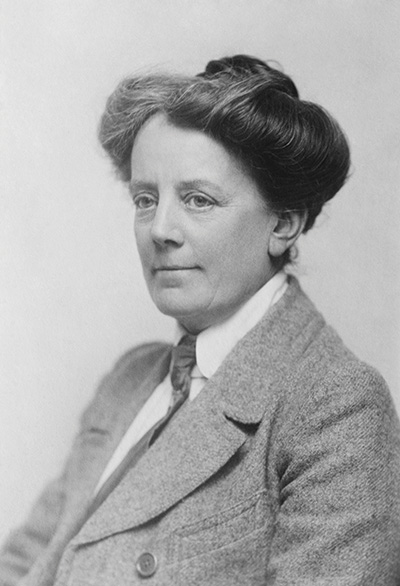Ethel Smyth

- Born: April 22, 1858, Sidcup, United Kingdom
- Died: May 8, 1944, Woking, United Kingdom
“On the Cliffs of Cornwall,” Prelude to Act II of The Wreckers
- Composed: 1903
- Premiere: The opera was first performed November 11, 1906 in Leipzig, Richard Hagel conducting
- Instrumentation: 2 flutes, piccolo, 2 oboes, English horn, 2 clarinets, bass clarinet, 2 bassoons, contrabassoon, 4 horns, 2 trumpets, 3 trombones, tuba, timpani, bass drum, crash cymbals, chimes, snare drum, suspended cymbals, tam-tam, tenor drum, triangle, harp, strings
- CSO notable performances: These performances are the work’s CSO premiere.
- Duration: approx. 9 minutes
Ethel Smyth’s long-neglected Wreckers is one of the most brilliant, and most disturbing, operas from the turn of the last century. Smyth herself was an utterly fascinating figure: the first woman to have an opera performed at a major venue (Covent Garden and The Met), she was also an active fighter for women’s suffrage and an incisive memoirist who openly discussed her lesbianism. She was the first female composer to receive the knighthood: she became Dame Ethel in 1922.
The richness of Smyth’s harmonic language and orchestration in The Wreckers betrays Wagner’s influence, but she had a dramatic vision all her own, in which philosophy, religion and politics all played a part. Smyth and Henry Brewster (her only male lover, who wrote the libretto in French as Les naufrageurs) based their three-act opera on a Cornish myth. According to the myth, coastal populations lured ships to the rocks to cause them to founder; they would then plunder the ships and kill the crews. A recent study claims that while the plundering of sunken vessels was common, there is little historical evidence for any intentional wrecking of ships. Yet, in the opera, the very survival of the village depends on this criminal activity, which is condoned by their spiritual leader as the will of God. Anyone who tries to warn the ships away from danger is considered a traitor and put to death. To the spiritual leader’s horror, it turns out that the warning beacon was lit by his own wife and her lover, who must then pay for this deed with their lives.
The prelude “On the Cliffs of Cornwall” introduces Act II, in which the treason is committed. The music is ominous, full of dramatic tension that explodes in a climactic tutti before returning to the gloomy mysteries of the opening.
—Peter Laki